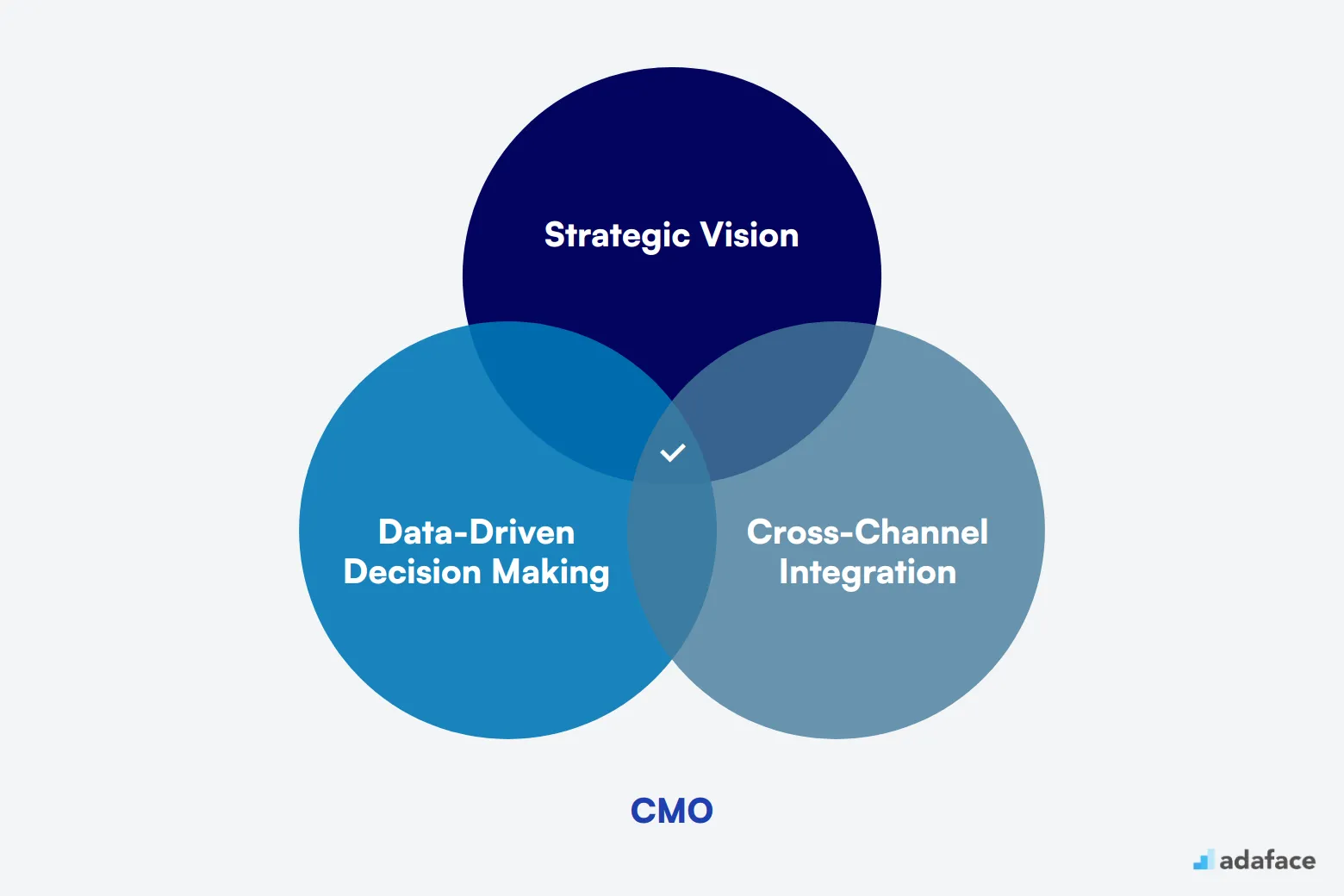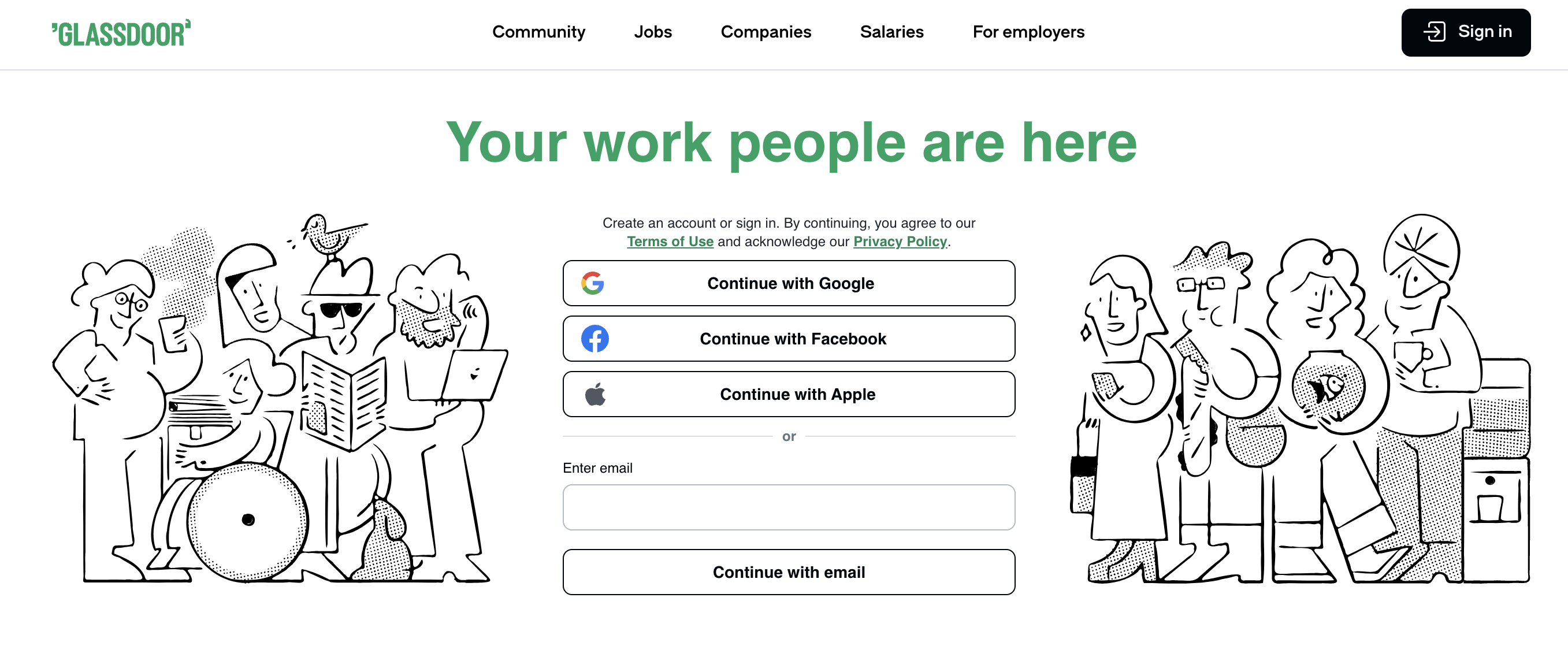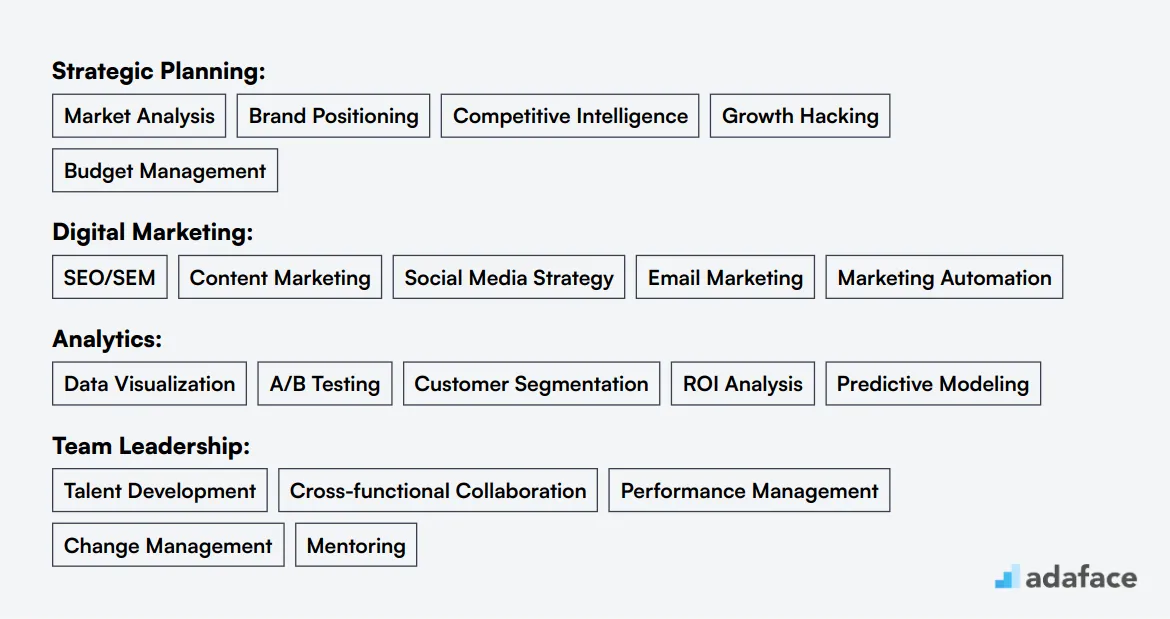Hiring a Chief Marketing Officer (CMO) is a significant decision that can shape your company's brand identity and market position. Many organizations underestimate the complexity of this role, often focusing solely on traditional marketing skills while overlooking the strategic and leadership qualities necessary for success in today's dynamic business landscape.
This comprehensive guide will walk you through the process of hiring a top-tier CMO, from understanding the role to conducting effective interviews. We'll cover key skills to look for, how to craft an compelling job description, and where to find the best candidates. For a deeper dive into CMO-specific interview questions, check out our detailed article on CMO interview questions.
Table of contents
Why Hire a CMO?
A Chief Marketing Officer (CMO) can be a game-changer for your company's growth strategy. They can address key challenges like brand inconsistency, ineffective marketing campaigns, or poor customer engagement. For instance, a CMO might revamp your digital presence to boost online sales and customer retention.
Consider hiring a CMO when:
- Your marketing efforts lack direction or cohesion
- You're struggling to measure marketing ROI
- Your company is ready to scale and needs expert guidance
Before committing to a full-time CMO, assess if your current marketing challenges require ongoing, high-level strategic input. If you're unsure, consider working with a marketing consultant to evaluate your needs and potential ROI from hiring a permanent CMO.

What does a CMO do?
A Chief Marketing Officer (CMO) is the executive responsible for an organization's marketing strategies and initiatives. They ensure that the company's messaging aligns with business goals and effectively reaches target audiences.
Day-to-day tasks of a CMO include:
- Developing and overseeing marketing strategies that enhance brand awareness and drive growth.
- Coordinating with other executives like Chief Revenue Officers to align marketing campaigns with sales objectives.
- Leading a team of marketing professionals, ensuring they have the tools and resources to succeed.
- Managing the marketing budget, ensuring optimal use of resources.
- Analyzing market trends to identify new opportunities for the business.
For more insights into the role, refer to our detailed CMO job description.
Key Skills and Qualifications for a CMO
When hiring a Chief Marketing Officer (CMO), creating a solid candidate profile is essential. The challenge often lies in distinguishing between what's required and what can be considered a preference. This clarity helps streamline the selection process for recruiters.
Here are some commonly required and preferred skills and qualifications for the CMO role:
- Required Skills and Qualifications:
- Bachelor's degree in Marketing, Business, or related field
- 10+ years of marketing experience with 5+ years in senior leadership roles
- Proven track record of developing and executing successful marketing strategies
- Strong analytical skills with experience in data-driven decision making
- Excellent communication and leadership abilities
- Preferred Skills and Qualifications:
- MBA or advanced degree in Marketing
- Experience in the company's industry or related sectors
- Proficiency in marketing automation and CRM tools
- International marketing experience
- Knowledge of emerging marketing technologies and trends
| Required skills and qualifications | Preferred skills and qualifications |
|---|---|
| Bachelor's degree in Marketing, Business, or related field | MBA or advanced degree in Marketing |
| 10+ years of marketing experience with 5+ years in senior leadership roles | Experience in the company's industry or related sectors |
| Proven track record of developing and executing successful marketing strategies | Proficiency in marketing automation and CRM tools |
| Strong analytical skills with experience in data-driven decision making | International marketing experience |
| Excellent communication and leadership abilities | Knowledge of emerging marketing technologies and trends |
How to write a CMO job description?
Crafting a compelling Chief Marketing Officer (CMO) job description is key to attracting top-notch talent for your organization. Once you define the ideal candidate profile, the next step is capturing that in a job description to make the right candidates take notice.
- Highlight strategic responsibilities and impact: Clearly outline the CMO's role in driving marketing strategy and overall business goals. Emphasize how their leadership will shape the brand's future and success. For detailed insights, refer to our CMO job description.
- Balance marketing expertise with leadership qualities: While marketing and industry experience are important, don't overlook soft skills like leadership, communication, and team-building. A CMO must effectively lead teams and collaborate across departments.
- Showcase your company's unique value proposition: Highlight what makes your company an exciting place to work. Whether it's innovative projects, a dynamic team culture, or growth opportunities, these elements can set your job listing apart and capture the interest of leading marketing professionals.
Top Platforms to Find and Hire CMOs
Now that you have a well-crafted job description, it's time to list your CMO position on job platforms to attract top candidates. Choosing the right platforms can significantly impact the quality and quantity of applicants you receive. Let's explore some of the best options for finding your next marketing leader.
LinkedIn is ideal for full-time positions and professional networking. It allows recruiters to connect directly with top-level candidates.

Indeed
Indeed is useful for hiring both full-time and part-time CMOs due to its wide reach and large candidate pool.

Glassdoor
Glassdoor is advantageous for full-time roles while providing insights into company culture and salary expectations.

Beyond these popular sites, there are specialized platforms catering to executive-level and startup-focused recruitment. The Ladders is excellent for high-level CMO positions, while AngelList and Founders Network are ideal for startups seeking innovative marketing leaders. Remember, the best recruitment strategy often involves using a mix of these platforms to cast a wide net and find the perfect CMO for your organization.
How to Screen CMO Resumes: Keywords to Look For
Resume screening is an essential part of the hiring process for a CMO, as it helps narrow down the pool of candidates to those who best fit the role. Given the high stakes involved in hiring a Chief Marketing Officer, identifying standout candidates early can save time and resources.

When manually screening resumes, focus on identifying keywords related to core qualifications and skills. Look for terms like "marketing strategy," "data-driven decision making," and "cross-channel integration." These keywords indicate the candidate has experience in strategic planning and leadership crucial for a CMO role. Quickly glance through each resume to spot these must-have terms before moving to the next screening stage.
Another approach to streamline resume screening is by using AI LLMs, like ChatGPT, which can automate the keyword matching process. These tools can quickly analyze resumes and highlight those that align with your key requirements, reducing manual labor. By leveraging AI, recruiters can focus on interviewing the most promising candidates identified through AI-driven screenings.
Here's an example of a prompt you might use with an AI tool:
TASK: Screen resumes to match job description for Chief Marketing Officer role
INPUT: Resumes
OUTPUT: For each resume, provide the following information:
- Email id
- Name
- Matching keywords
- Score (out of 10 based on keywords matched)
- Recommendation (detailed recommendation of whether to shortlist this candidate or not)
- Shortlist (Yes, No or Maybe)
RULES:
- If unsure about a candidate's fit, put the candidate as Maybe instead of No
- Keep recommendation crisp and to the point.
KEYWORDS DATA:
- Marketing Strategies (Customer Segmentation, Brand Positioning)
- Leadership (Talent Development, Cross-functional Collaboration)
- Digital Marketing (SEO, Content Marketing)
- Analytics (Data Visualization, ROI Analysis)
Recommended Skills Tests for CMO Assessment
Skills tests are an effective way to evaluate potential CMOs beyond their resumes. They provide objective insights into a candidate's abilities and marketing expertise. Here are five key tests we recommend for assessing CMO candidates:
Marketing Aptitude Test: This assessment evaluates a candidate's overall marketing knowledge and strategic thinking. It covers areas like market research, branding, and campaign planning - core skills for any CMO.
Digital Marketing Test: In today's digital-first world, CMOs need to be well-versed in online marketing strategies. This test assesses skills in SEO, social media marketing, content strategy, and other digital channels.
Business Development Test: CMOs often play a key role in business growth. This assessment measures a candidate's ability to identify new opportunities, develop partnerships, and drive revenue.
Marketing Analysis Test: Data-driven decision making is critical for modern CMOs. This test evaluates a candidate's proficiency in analyzing marketing data, interpreting metrics, and deriving actionable insights.
Growth Marketing Test: CMOs need to drive sustainable growth. This assessment focuses on skills related to customer acquisition, retention strategies, and scaling marketing efforts.
Structuring the Interview Stage for CMO Candidates
After candidates pass the initial skills tests, it's time for technical interviews to assess their hard skills in-depth. While skills tests are great for initial screening, technical interviews help identify the best-fit candidates for the CMO role. Let's explore some key interview questions to ask your CMO candidates.
Consider asking: 'How would you develop our brand strategy?', 'What metrics do you use to measure marketing success?', 'How do you stay updated with marketing trends?', 'Can you describe a marketing campaign you're proud of?', and 'How would you align marketing goals with overall business objectives?'. These questions help evaluate the candidate's strategic thinking, analytical skills, industry knowledge, practical experience, and business acumen - all crucial for a successful CMO.
What are the ranks of Chief Marketing Officers?
In many organizations, the role of Chief Marketing Officer (CMO) is often confused with other marketing leadership positions. Understanding the hierarchy within the marketing department can help recruiters and hiring managers differentiate responsibilities and expectations associated with each role.
The Chief Marketing Officer (CMO) is a senior executive responsible for overseeing the company's marketing strategies. They work closely with other department heads and the CEO to align marketing efforts with business goals. CMOs often have a seat at the executive table, influencing company-wide decision-making.
Vice President of Marketing typically reports directly to the CMO and is responsible for implementing marketing strategies developed at the executive level. They oversee the marketing team and ensure that campaigns align with broader business objectives.
Below the VP, the Director of Marketing manages day-to-day operations and coordinates campaigns across various channels. They ensure that the marketing team meets its goals and maintain the brand's voice and message consistency.
The Marketing Manager operates under the Director of Marketing and handles specific aspects of marketing projects such as content creation or analytics. They manage smaller teams and are responsible for executing marketing campaigns and reporting their progress.
For more details on the specific roles and responsibilities of a CMO, you can refer to this CMO job description.
Hire the Best CMOs for Your Organization
We've covered the key aspects of hiring a CMO, from understanding their role and responsibilities to crafting an effective job description. We've also explored platforms for finding top talent, resume screening techniques, and structuring interviews to assess candidates thoroughly.
The most important takeaway is to use well-defined job descriptions and skills tests to make your CMO hiring process more accurate. By combining these tools with a structured interview process, you'll be better equipped to identify and hire the best CMO for your organization's needs.
Marketing Aptitude Test
FAQs
Key skills for a CMO include strategic thinking, leadership, data analysis, digital marketing expertise, brand management, and the ability to drive revenue growth. They should also possess excellent communication skills and a deep understanding of market trends.
An effective CMO job description should outline the strategic responsibilities, required qualifications, and expected outcomes for the role. Include details about your company culture, growth plans, and the CMO's place in the executive team. Highlight both technical marketing skills and leadership qualities.
Top platforms for finding CMO candidates include executive search firms, LinkedIn, industry conferences, and professional marketing associations. Networking within your industry and seeking referrals from other executives can also be highly effective.
To assess strategic thinking, present candidates with real-world marketing challenges and ask them to outline their approach. Use case studies, scenario-based questions, and ask about their past experiences in developing and implementing marketing strategies.
Ask questions that probe their leadership style, strategic vision, experience with digital transformation, ability to measure marketing ROI, and how they've handled challenges in previous roles. Include questions about their approach to team building and cross-departmental collaboration.
The CMO hiring process typically takes 3-6 months, including time for sourcing candidates, multiple rounds of interviews, possibly assessment tests, and negotiations. The timeline can vary based on the urgency of the hire and the availability of qualified candidates.
The CEO should be actively involved in the CMO hiring process, particularly in the final stages. They should align on the strategic vision for marketing, assess cultural fit, and ensure the CMO's goals are in sync with overall business objectives. The CEO's input is critical in making the final hiring decision.

40 min skill tests.
No trick questions.
Accurate shortlisting.
We make it easy for you to find the best candidates in your pipeline with a 40 min skills test.
Try for freeRelated posts
Free resources



